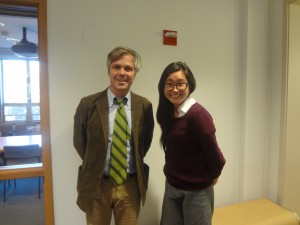By Alyssa Paredes (Yale U)
Alyssa Paredes (AP): What experiences led to your interest in studying convenience stores, or konbini, in Japan?
Gavin H Whitelaw (GW): The first of the big convenience store chains began expanding in Tohoku when I was a teacher in rural Yamagata. I became a denizen of Sunkus, FamilyMart and Lawson. They gave me a place to go and get things quickly, minus the intense observation I felt at other local shops. A convenience they offered was this alternative social space. That idea began to gestate.
While doing my Master’s degree, I took courses with James Watson, editor of Golden Arches East: McDonald’s in East Asia. McDonald’s is helpful for thinking about globalization. But the convenience store in Japan seemed more engaging and complex given its ties to neighborhood shop culture and focus on an expanding range of day-to-day needs. Anthropology offered a way to move beyond a management studies approach to the topic.
AP: The convenience store seems to me to be a challenging ethnographic object because interactions can often be so momentary and seemingly unreflexive. How did you negotiate the issue of temporality in your fieldwork?
GW: During my pre-dissertation research, I was an active consumer and “inquisitive observer.” But there was more to the store than I could observe from just the aisles. So I decided to put myself in the shoes of the people who work there, an experience that embedded me in a web of relationships involving owners and their families, workers, corporations, customers, and neighborhood groups.
Repositioning myself this way grounded me in a particular place. As I worked, the store became more than simply a site to buy food and read magazines. It was a source of livelihood and played a meaningful role in how people negotiated certain demands and positioned themselves. Events—an accident or snowfall, exam season or a local festival—deepened my perspective on certain continuities within a rapidly transforming commercial landscape.
AP: You chose to do your “observant participation” at branded, recognizable institutions. But the strange thing about convenience stores is that there is also a kind of anonymity in their ubiquity. How did this play out while you were conducting research, and did any ethical issues come up in your ethnographic writing?
GW: You raise a good point. Donning the employee uniform carries a certain set of responsibilities. There were times at the counter when I wanted to chat more with a particular customer, but didn’t because it disrupted the impersonal familiarity critical to the store’s functioning. That experience of “holding back” provided ethnographic grist in my analysis. Clerks observe a great deal and silence may be part of a tacit social agreement. As customers, we also participate in this process. Such insight helps reorient how we approach places like konbini and the roles they serve.
AP: In your research, you discuss the konbini as a pioneering model of cultural global retail that “makes local tastes and conditions central to the functioning of the store.” How might the study of convenience stores influence the ways we think about Japan, and globalization in general?
GW: The convenience store is useful for exploring theories and questioning assumptions about Japan. It is part and parcel of global capitalism, yet its expansion and impact are hardly uniform. In the United States, it hasn’t transfigured retail and small business to the extent it has in Japan. American convenience stores might sell gas or have a pharmacy counter, but customers rarely interact with actual owners. In Japan, convenience stores calibrate to everyday needs very differently. While some shops may feel anomic with high turnover in people and products, cultural entailments persist. Behind the counter,konbini stubbornly remain family-run operations. America’s main streets are overshadowed by mammoths like Amazon and Wal-Mart, but in Japan, the small corner store is relied on to provide food, daily necessities, and innovative services with a modicum of social interaction. The konbini’s emergence as a commercial hub and vibrant human crossroads (ningen kōsaten) was largely unanticipated. Its expansion, while linked to changes in the family, economic life, and government policy, encourages more careful assessment of how terms like “neoliberalism” and “precarity” are applied to the cultural and social conditions we observe today.
The accessibility of my research topic benefits my teaching. Convenience stores are, literally, just around the corner. Students use them and hold opinions about them, but typically haven’t stood behind the counter. Ethnography takes that step. Its power lies in the ability to share something about how other people go about their lives while revealing to us something about ourselves. Approaching the convenience store as a life world rather than a momentary stop turns a familiar global site into a window onto the dynamics of family, work, and market relations in Japan.
AP: I’m curious to hear about your next line of research. Could you share with us a preview of your current research project?
GW: My konbini research and work on material culture and foodways made me interested in a corollary to consumer convenience: inconvenience. One direction this has taken me is to follow waste, especially food waste, to better understand the political economy of disposal. A second, complementary field project looks at a range of conventions that undergird people’s relationship to the environment, landscape and agriculture. In both projects, I am particularly intrigued with attitudes and practices that persist despite being deemed by some as inefficient, irrational, or unhealthy.
Gavin H Whitelaw is a sociocultural anthropologist whose research focuses on globalization, commerce, work, food, and material culture, particularly in contemporary Japan. He is associate professor of anthropology at International Christian University and is a visiting scholar Harvard University’s Reischauer Institute of Japanese Studies during the 2014-2015 academic year.
Alyssa Paredes is a PhD student in the department of anthropology at Yale University.
Please send news items, contributions and comments to SEAA Contributing Editors Heidi K Lam (heidi.lam@yale.edu) or Yi Zhou (yizhou@ucdavis.edu).

